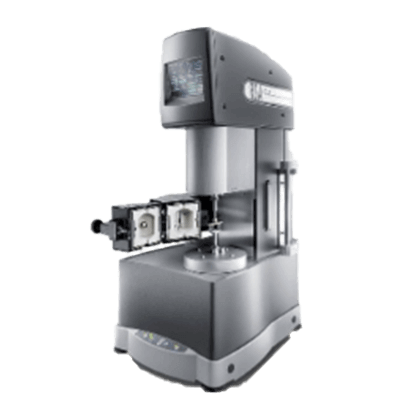What Is a Dynamic Mechanical Analyzer (DMA)?

Dynamic mechanical analyzer (DMA) is an instrument that evaluates the viscoelasticity of a sample, which includes both viscosity and elasticity properties. DMA is used to understand the physical properties of materials, particularly polymers, and is essential in applications like plastic product development and food texture analysis.
There are two main types of viscoelasticity measurement instruments: DMA, which evaluates the dynamic mechanical analysis of individual materials such as metallic materials, and a rheometer, which assesses the viscoelasticity of paste-like materials similar to fluids.
Uses of Dynamic Mechanical Analyzer (DMA)
1. DMA
DMA is primarily used for evaluating plastic products and food textures, aiding in the understanding of properties such as shrinkage in the molding process of polymers and expansion during injection.
2. Rheometer
Rheometers are vital in characterizing the viscoelastic properties of materials in industries like food, pharmaceuticals, and cosmetics. They are used to quantitatively assess sensory characteristics such as texture and mouthfeel, ensuring consistent product quality.
Principle of Dynamic Mechanical Analyzer (DMA)
DMA measures viscoelasticity by applying an external force to a sample and observing the resulting behavior. The sample’s response to the applied force—whether it stores energy (elasticity) or dissipates heat (viscosity)—provides insights into its viscoelastic properties.
1. Viscosity
Viscoelasticity involves strain generation upon force application and the persistence of this strain even after the force is removed. This property is crucial in understanding the behavior of materials under stress and their subsequent recovery.
2. Elasticity
Elastic properties are observed when a material returns to its original state after the removal of an external force. This characteristic is important for materials that need to maintain their shape and structural integrity under varying conditions.
Types of Dynamic Mechanical Analyzer (DMA)
1. DMA
DMA is an instrument to measure dynamic mechanical properties. For example, viscosity and elasticity are important indicators in understanding the physical properties of polymeric materials. In the molding process of polymers, shrinkage of molded products and expansion during injection are issues.
This phenomenon is also caused by viscoelasticity which must be taken into account when designing molding. Mainly, equipment capable of measuring DMA is used. The external forces applied can be in tension, compression, cantilever bending, free-support 3-point bending, and shear modes.
2. Rheometer
Rheometers are used to measure viscosity properties in the food, pharmaceutical, and cosmetic industries. It is important to quantitatively evaluate the human sensory characteristics of food products, such as texture, chewiness, crispness, melt-in-the-mouth, and throat feel. Since there are individual differences in such sensory evaluation, numerical evaluation is indispensable to ensure stable quality.
Similar to a rheometer is a viscometer. Viscometers evaluate physical properties by applying an external force in only one direction, mainly rotation. The difference is that a rheometer, like a DMA, evaluates properties through vibration (sinusoidal waves).
Other Information on Dynamic Mechanical Analyzer (DMA)
Evaluation by Dynamic Viscoelasticity Measurement
Dynamic viscoelasticity measurements involve applying a cyclic oscillatory load to a sample and evaluating properties like storage modulus, loss modulus, and tan δ. These parameters provide a comprehensive understanding of a material’s elastic and viscous behaviors, indicating how it will perform under real-world conditions.